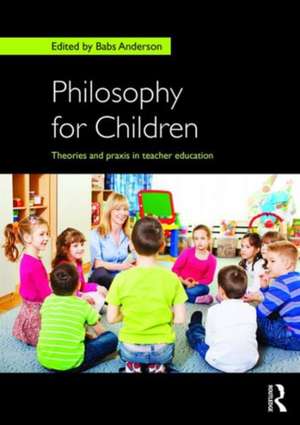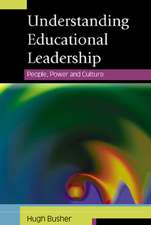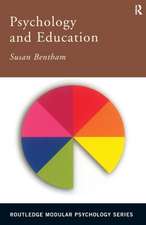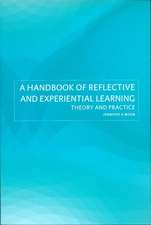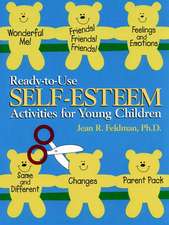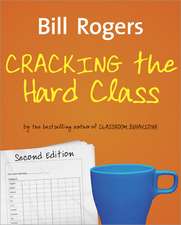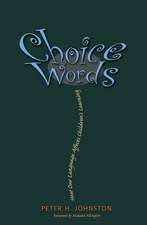Philosophy for Children: Theories and praxis in teacher education
Editat de Babs Andersonen Limba Engleză Paperback – 25 aug 2016
Chapters identify the different theories and practices that have emerged and discuss the necessity for a reflective approach that P4C brings to education. The book highlights how this movement can fit into the early years, primary and secondary curriculum and the challenges and rewards that come with it. Chapters include:
- The Evolution of Philosophy for Children in the UK
- Pedagogical Judgement
- Negotiating meaning in classrooms: P4C as an exemplar of dialogic pedagogy
- The impact of P4C on teacher educators
- Being and becoming a philosophical teacher
| Toate formatele și edițiile | Preț | Express |
|---|---|---|
| Paperback (1) | 381.72 lei 6-8 săpt. | |
| Taylor & Francis – 25 aug 2016 | 381.72 lei 6-8 săpt. | |
| Hardback (1) | 1164.44 lei 6-8 săpt. | |
| Taylor & Francis – 22 aug 2016 | 1164.44 lei 6-8 săpt. |
Preț: 381.72 lei
Nou
Puncte Express: 573
Preț estimativ în valută:
73.04€ • 79.59$ • 61.55£
73.04€ • 79.59$ • 61.55£
Carte tipărită la comandă
Livrare economică 24 aprilie-08 mai
Preluare comenzi: 021 569.72.76
Specificații
ISBN-13: 9781138191754
ISBN-10: 1138191752
Pagini: 166
Ilustrații: 10
Dimensiuni: 174 x 246 x 14 mm
Greutate: 0.27 kg
Ediția:1
Editura: Taylor & Francis
Colecția Routledge
Locul publicării:Oxford, United Kingdom
ISBN-10: 1138191752
Pagini: 166
Ilustrații: 10
Dimensiuni: 174 x 246 x 14 mm
Greutate: 0.27 kg
Ediția:1
Editura: Taylor & Francis
Colecția Routledge
Locul publicării:Oxford, United Kingdom
Cuprins
List of Contributors
Foreword
Part 1: The context
1. The Evolution of Philosophy for Children in the UK
Roger Sutcliffe
2. Education as a philosophical endeavor
Naomi McLeod
Part 2: P4C as a pedagogical approach
3. The construct of the child: The ‘C’ in PwC
Sue Lyle
4. Pedagogical Judgment
Darren Garside
5. Negotiating meaning in classrooms: P4C as an exemplar of dialogic pedagogy
John Smith
Part 3: P4C in school
6. Philosophy for Children in Early Childhood Education
Fufy Demissie
7. P4C in the primary school
Kathy Stokell, Diane Swift and Babs Anderson
8. P4C in Secondary Science
Lynda Dunlop
9. An evaluation of P4C
Sarah Meir and Julie McCann
10. P4C and Education for diversity
Clive Belgeonne
Part 4: The Higher Education context
11. Philosophy for Children (P4C) in Higher Education
Lizzy Lewis and Grace Robinson
12. The praxis of P4C in Higher Education
Fufy Demissie
13. Challenging assumptions and making progress
Georgia Prescott
14. The impact of P4C on teacher educators
Babs Anderson and Karen Rogan
15. Being and becoming a philosophical teacher
Joanna Haynes
Foreword
Part 1: The context
1. The Evolution of Philosophy for Children in the UK
Roger Sutcliffe
2. Education as a philosophical endeavor
Naomi McLeod
Part 2: P4C as a pedagogical approach
3. The construct of the child: The ‘C’ in PwC
Sue Lyle
4. Pedagogical Judgment
Darren Garside
5. Negotiating meaning in classrooms: P4C as an exemplar of dialogic pedagogy
John Smith
Part 3: P4C in school
6. Philosophy for Children in Early Childhood Education
Fufy Demissie
7. P4C in the primary school
Kathy Stokell, Diane Swift and Babs Anderson
8. P4C in Secondary Science
Lynda Dunlop
9. An evaluation of P4C
Sarah Meir and Julie McCann
10. P4C and Education for diversity
Clive Belgeonne
Part 4: The Higher Education context
11. Philosophy for Children (P4C) in Higher Education
Lizzy Lewis and Grace Robinson
12. The praxis of P4C in Higher Education
Fufy Demissie
13. Challenging assumptions and making progress
Georgia Prescott
14. The impact of P4C on teacher educators
Babs Anderson and Karen Rogan
15. Being and becoming a philosophical teacher
Joanna Haynes
Notă biografică
Babs Anderson is a lecturer in Early Childhood at Liverpool Hope University, UK and teaches on a number of Early Childhood undergraduate and postgraduate courses.
Descriere
Philosophy for Children (P4C) is a movement that teaches reasoning and argumentative skills to children of all ages. This book looks at the progress that P4C has made in the UK in addressing issues of literacy, critical thinking, PSHE, education for sustainable development and wider issues such as bullying. Chapters identify the different theories and practices that have emerged, and discuss the necessity for a reflective approach that P4C brings to education. The book highlights how this movement can fit into the early years, primary and secondary curriculum, and the challenges and rewards that come with it.
